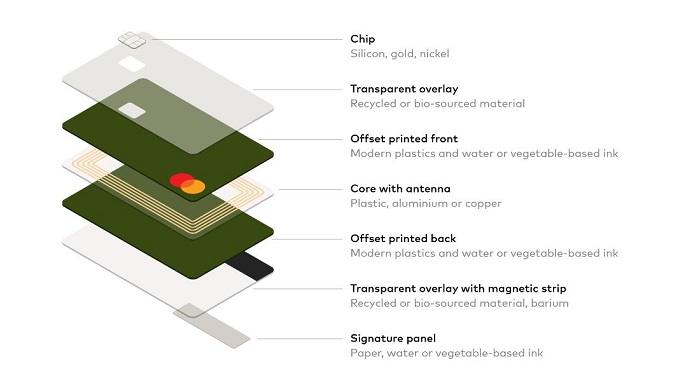- Sustainable cards to be validated by independent auditor
- Roughly 16,000 tons of plastics are used to produce cards globally every year

From January 1, 2028, all newly-produced Mastercard plastic payment cards will be made from more sustainable materials – including recycled or bio-sourced plastics such as rPVC, rPET, or PLA and approved through a certification program.
The company says that it will support its global issuing partners in this transition away from virgin PVC. rPVC, rPET and PLA are forms of bioplastics or recycled plastics that are already used in other industries for packaging and industrial applications.
Once in force, all newly made cards will be certified by Mastercard to assess their composition and sustainability claims; this certification will then be validated by an independent third-party auditor. Validated cards will be able to carry the Card Eco Certification mark. Currently, about 3 billion cards are made every year with each containing about 5 grams of plastic.
Mastercard launched its Sustainable Card Program in 2018. Since then, over 330 issuers across 80 countries have signed up, working in partnership with major card manufacturers to transition more than 168 million cards across its network to recycled and bio-based materials. The newly set target for 2028 will accelerate its efforts to make sustainable cards more accessible.
It is worth noting that disposing of bank cards is not currently easy for eco-conscious consumers. Most of the information online is with regards to how to ensure there is no security compromise when cards are disposed. Due to the many individual layers of material required to produce a card, most end up in rubbish bins after being cut up into pieces.
(Ed note: I have a drawer full of cut-up cards with no idea of what to do with them.)
Consumer concerns are also not limited to the plastic component of credit cards, but also their purchasing habits. A study found that 64% of Americans are looking for a credit card that automatically offsets a portion of their purchase’s environmental impact.
 Mastercard has previously launched its Carbon Calculator, allowing consumers to learn how their carbon footprint is calculated and tips on reducing their footprint through their spending habits.
Mastercard has previously launched its Carbon Calculator, allowing consumers to learn how their carbon footprint is calculated and tips on reducing their footprint through their spending habits.
“At Mastercard we are leading and shaping our industry’s collective pursuit of a more sustainable, more environmentally conscious future,” said Ajay Bhalla (pic), President of Cyber & Intelligence at Mastercard. “As our customers respond to increased consumer desire to make more eco-friendly choices, we are making a firm commitment to reducing our environmental footprint – for the benefit of people, planet and inclusive growth.”

